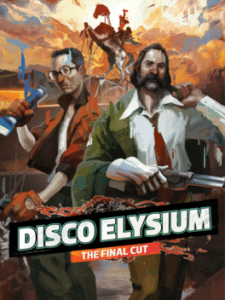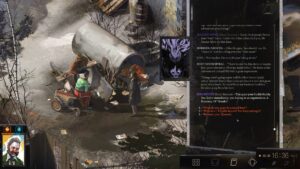
In Martinaise, the grimy seaside district of the capital Revachol, an amnesiac detective jogs across streets marked with scars from a failed revolution.
In the role-playing video game “Disco Elysium,” you play as a detective who drank so much he forgot that he was a police officer. He doesn’t even know his own name. Nevertheless, you must drag yourself off the ground, find your missing shoe, and join your partner, Kim Kitsuragi, in finding the person who killed the man hanging in the courtyard of the Whirling-in-Rags hostel.
“Disco Elysium” makes you fall in love with Martinaise, with its gray skies, Doomed Commercial Area and horn music turned tinny by the speakers in the town square. Because, you see, it’s not quite about the city. It’s about the people. The heartbeats. The tangle of ideologies.
One of “Disco Elysium’s” greatest strengths is its characters. Every NPC you come across feels like a real person, with experiences just as bright and vivid and mundane as your own.
“Disco Elysium” was a great game already. “The Final Cut,” which was launched on March 30, made it even better by adding full voice-acting, new NPCs and political vision quests. By giving voices to each character, every person you meet feels truly alive.
It’s one thing to read the words on the screen. It’s completely another to hear them, full of contempt or fear or confusion. And usually, that emotion is directed toward you. It makes your actions feel even more consequential.
“Disco Elysium” is a game that demands a second (or third, or fourth) playthrough. While major plot beats are the same, the player has full control over the development of the main character. Each quest the player completes awards them with experience points. Once you obtain 100 experience points, you gain a new skill point, which you can put into one of your character’s 24 skills.
This skill tree system is not unlike other systems in other RPGs, but “Disco Elysium” is unique in the fact that each of your character’s skills present themselves as voices in your head. For example, during a conversation with an NPC, Volition will chime in to urge you to be a good person with self-control, while Electrochemistry will intrude to argue that drinking on the job is a perfectly fine and respectable thing to do.
The more points you put into a skill, the more active that voice becomes. And sometimes, those voices are wrong.
Part of “Disco Elysium’s” re-playability is the way it encourages and even rewards failure. Each failed skill check brings on hilarity, embarrassment and sometimes even opens up new quests that you otherwise would be unable to embark upon.
Sometimes those failures make you die in ridiculous ways, and other times, they further humanize your character by drawing into focus the messy reality of lost relationships. Either way, “Disco Elysium” enforces the idea that you need not worry about perfectionism while playing, which is refreshing.

Of course, the game itself is not perfect, either. One major disadvantage of having fixed plot points is that you already know what’s going to happen after your first playthrough. In addition, some quests require you to hear paragraphs and paragraphs of exposition that you already know your second time around.
“Disco Elysium” is a game you want to take your time playing, but I found myself getting impatient when it came to long conversations and ended up skipping through a few of them.
I played the “Final Cut” on the PC, and for me, bugs were minimal. The audio for some bits of dialogue did not play as they were supposed to, but it didn’t interrupt the gameplay too much.
Despite its minor bugs, the “Final Cut” fully enhanced my experience playing “Disco Elysium.” The game is very text-heavy, so having all character interactions fully voice-acted allowed me to focus more on the beautifully rendered environments and character portraits in the game.
Without having to focus so heavily on reading, I was able to play the game for longer periods of time, and I found myself noticing small details in each setting that I hadn’t noticed in my first play-through.
“Disco Elysium” is a beautiful, funny, tragic game about a lot of things. Philosophy, politics, love, loss. It explores these themes with nuance and fascinating imagery. Ever since I first played the game in Dec. 2020, it has grabbed onto my mind and not let go.
“The Final Cut” elevated “Disco Elysium” by emphasizing all its best qualities.

